Feed aggregator
PRE-ORDER NOW – Sufficiently Analysed Magic
The last thing the hyper-advanced Human Confederation expected to encounter on Darius – a far distant and long lost colony world – was actual magic, sorcerers and magicians and other inexplicable feats that the most advanced technology could not duplicate. Determined to discover the source of the mystery, the Confederation dispatched a survey team to Darius and eventually discovered that the human settlers had tapped into the Darius Machine, an inexplicable piece of alien technology that granted supernatural powers to those capable of calling upon its aid. The Darius Machine was accidentally destroyed, seemingly rendering the former godlike humans powerless, but leaving behind a number of children with strange and often frightening powers of their own.
That was seventeen years ago.
Since then, the Darius Children have been raised on Clarke, an isolated world where they can be studied as well as protected from the remainder of the human race. Their powers appear simplistic and yet very dangerous, provoking fear as well as awe in their teachers; their attempts to expand their abilities, and bring others into their mental network, threaten the very fabric of reality itself. As they start to demand the right to leave their homeworld, a sociopath strikes and kidnaps one of the Children, intending to sell her to the highest bidder. Another Child must go in pursuit …
And hidden in the shadows, an unseen manipulator lays the seeds of a galaxy-wide conflagration.
Purchase from the links HERE or BOOKS2READ!

What Moves the Dead - Book Review (reread/repost)

What Moves the Dead (Sworn Soldier #1)by T. Kingfisher
What is it about:From the award-winning author of The Twisted Ones comes a gripping and atmospheric retelling of Edgar Allan Poe's classic "The Fall of the House of Usher."
When Alex Easton, a retired soldier, receives word that their childhood friend Madeline Usher is dying, they race to the ancestral home of the Ushers in the remote countryside of Ruritania.
What they find there is a nightmare of fungal growths and possessed wildlife, surrounding a dark, pulsing lake. Madeline sleepwalks and speaks in strange voices at night, and her brother Roderick is consumed with a mysterious malady of the nerves.
Aided by a redoubtable British mycologist and a baffled American doctor, Alex must unravel the secret of the House of Usher before it consumes them all.
What did I think of it:I totally pre-ordered this book because it sounded cool and I couldn't resist that cover! (The end-papers have a really cool illustration as well.)
And this is indeed a really cool read!
It's a retelling of Edgar Allan Poe's "The Fall of the House of Usher." , but you can definitely read it without having read Poe's original. It's atmospheric, disturbing, and delightfully creepy.
I loved Alex, they're a great hero: down to earth, pragmatic, but also caring towards their friends. And their narration brings some humor to an otherwise creepy tale. Having read a lot of Poe's works, the plot wasn't unfamiliar, but the way Kingfisher gave it life and brought new things to it made that I was invested from the start.
A warning to those who might have read other books by Kingfisher (A Wizard’s Guide to Defensive Baking or Paladin's Grace for example): Kingfisher is a pen name used by Ursula Vernon for anything that doesn't fit the Ursula Vernon name, so this book is very different than some of the other books written under the Kingfisher name.
You bet i'll be trying to find more creepy, atmospheric beauty among the Kingfisher books though!
Why should you read it:It's a delightfully atmospheric read.
Thoughts on rereading:Yup: Still just as beautifully atmospheric as the first time. A total keeper. Now on to read the next one.
Comment on A Beginner’s Guide to Drucraft #32: Sigl Recycling (II) by Bill
Thanks again for the weekly Drucraft update. As always very useful and thought provoking. I’m wondering if Stephen would need a room to construct his own well or if it is just a piece of private open space, as I don’t think that essentia is constrained by walls and such? On the other hand he knows, at this stage, where a lot of natural, hidden wells can be found so he may be happy to use those locations.
Hum, perhaps he isn’t thinking at all about this anyway as he (currently) doesn’t have a lot of high power sygls to convert!
I hope that work on Book#4 is progressing well and that the sales of Books#1 & #2 continue to live up to expectations. Sadly, for me, A Judgement of Powers still seems a long way from publication. Six months to go!
Book review: Castaways (The Castaways #1) by Craig Schaefer

Book links: Amazon, Goodreads
ABOUT THE AUTHOR:
Publisher: Length: Formats:
Dark academia by Craig Schaefer? Yes, please. Especially the kind that leans hard into the dark. Castaways delivers good story, some eldritch horror vibe, and strong coming-of-age arcs.
Amy Nettle is a classic down-on-her-luck protagonist. She’s stuck in a dead-end life with limited way out. And when things go really south, the mysterious black envelope arrives. Suddenly, she’s whisked away to Saunders Academy, a magical school on a storm-tossed island surrounded by carnivorous mermaids, towering leviathans, and an ever-present sense that something is very wrong.
And if you flunk out? You get sent back to your old life without your magic, your memories, or even the promise of escape. And no one here wants to go back.
I’m a huge fan of Schaefer simple and concise writing. And characters. Amy and her new friends are coming of age in the middle of a mystery that keeps getting bigger and more terrifying. There are hints that this school - and whatever forces control it - are tied to the broader Daniel Faust/Harmony Black universe, and that may suggest an even larger conflict on the horizon.
For fans of Schaefer - it’s not as dark as other series, but it does get dark here and there.
Magic school has never felt this dangerous, and I loved every second of it. Now, where’s the sequel?
We No Longer Need Aliens to Feel Alienated: State of Paradise by Laura Van Den Berg
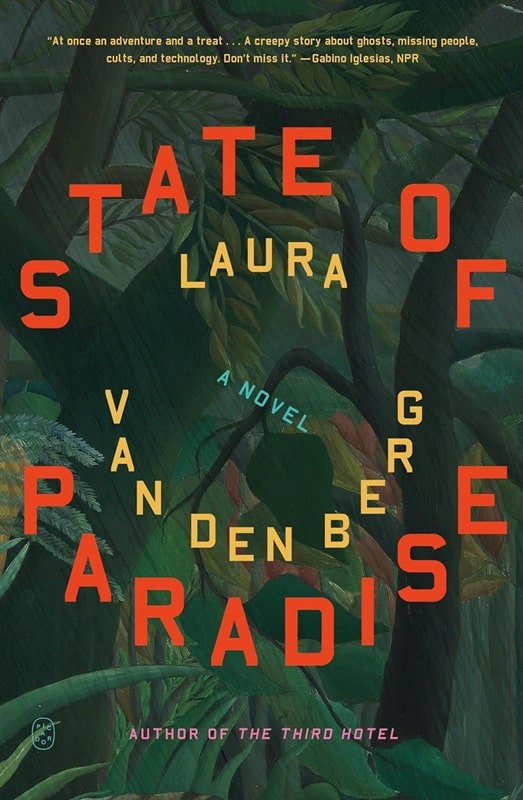
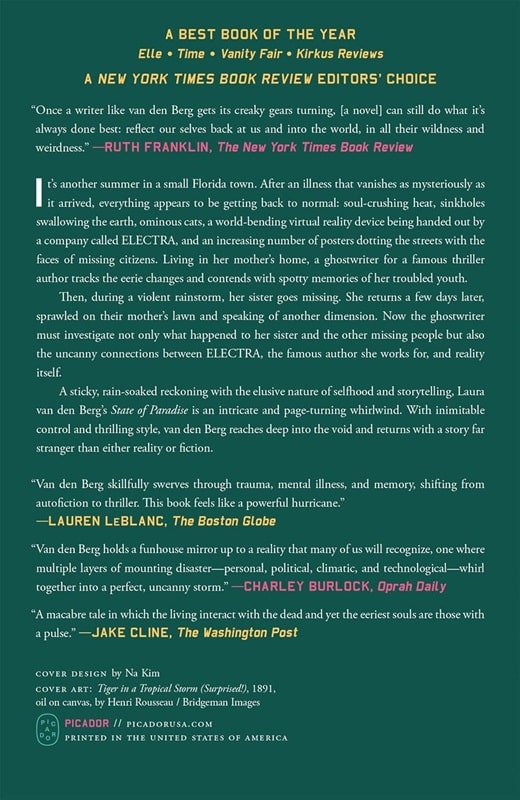
State of Paradise (Picador paperback reprint, July 8, 2025). Cover art:
detail from Tiger in a Tropical Storm by Henri Rousseau, 1891
When I was a kid there was a public service announcement on TV that went something like “Attention: Aliens. You are required by law to report by January 31st.” This was because of the Alien Act of 1940, otherwise known as the Smith Act. Basically, the legislation made it illegal to advocate the violent overthrow of the U.S. government and provided for a tracking system of non-citizens who, in the context of Nazi occupation of Eastern Europe and its then alliance with the Soviet Union, were potential suspects of espionage and sabotage. (Fun fact: prosecutions for advocating overthrow of the government have been ruled as unconstitutional violations of the First Amendment, in case you were wondering how any nitwit on social media can mouth off about doing just that.)
But as I didn’t know anything about this, the announcement always conjured an image of big headed, bug-eyed tentacled Martians registering at the local post office. Which I thought pretty funny. One thing I’ve learned over the years, and particularly these days, is that much of what adults say in all seriousness is often funny, but not in a “ha ha” way. More in a Jean Paul Sartre absurdist kind of way.
Needless to say, alien life forms are foundational science fiction, horror, and fantasy tropes. While some genre writers and filmmakers may very well have thought it just might be cool to tell stories about monsters from other worlds, the notion of aliens amongst us primarily serve as metaphors for, among other things, Communists and related usurpers of “normal” socio-political mores, fears of nuclear holocaust, technology run amok, repressed sexual desire, climate change, disease, and disembodiment.
Probably to a large extent due to the COVID-19 pandemic as well as severe climate events such as the California wildfires, today’s alienation storyline is less “aliens amongst us” and more “us alienated from the world.”
Which brings us to State of Paradise by Laura Van Den Berg.
The title is ironic, referring not only to Florida and its reputation as a refuge for the aged retired, the sunburned, and the weird, but that if the existential human condition is sometimes characterized using the Biblical metaphor of banishment from Eden, we currently find ourselves further away from Paradise than ever before.
In Florida, my husband runs. Ten miles a day seventy miles a week. a physical feat that is astonishing to me. He started running after he got stuck on a book he is trying to write, a historical account of pilgrims in medieval Europe. Back then it was not unusual for pilgrims to traverse hundreds of miles on foot… My husband is a trained historian and fascinated by journeys. He wants to understand what has become the pilgrimages in our broken modern world.
The first person narrator is
…a writer, though not a real one, I ghost for a very famous thriller writer. When I first got the job, I spent a month reading books by the famous author, to better understand the task that lay before me… the phrase everything is not as it seems appeared in nearly all the book descriptions.
Indeed, everything is not as it seems as the narrator (a kind of ghost herself) proceeds on a pilgrimage not only through actually weird Florida, where the 1930s Tarzan movies were filmed and non-native Pythons abound alongside Everglades alligators and Disney characters, but an alternate reality to which her sister and others somehow travel. Along the way are treated to torrential rain and flooding, sinkholes, virtual reality headsets, cults, and cats. And voluntary human extinction meetings. Just another day in Paradise.
With a history of being institutionalized, our narrator may be unreliable, and as a writer she is in the business of making things up. Not much cause for cognitive dissonance given the made-up unreliable narratives of our daily news cycle.
The plot, such that it is, concerns finding out what happened to her sister and others during their disappearances. And along the way what is happening to the narrator as she tries to figure out an increasingly strange world that nonetheless comes to define everyday existence. And whether she can trust what she is experiencing and what she remembers of those experiences.
Sometimes I wonder what we are supposed to do with our memories. Sometimes i wonder what our memories are for. A latch slips and the past floods in, knocking us flat. We leave places and we don’t leave places. Sometimes I imagine different versions of myself in all the different places I have ever lived, inching time in parallel.
This is a novel about the proverbial frog in boiling water, how because as the temperature only gradually rises, we don’t realize we’re being cooked. One absurdity follows another, and it is just how things are. We are now the aliens, journeying towards some unsettling destination, and we don’t have to bother to report.
One of the weirdest things about this period of time is the parts that still seem normal. Mundane and non-apocalyptical. Like how one minute we need an inflatable raft to cross the street and another we’re eating pasta at my sister’s house.
Or as Alice Cooper put it, “Welcome to my nightmare.”
David Soyka is one of the founding bloggers at Black Gate. He’s written over 200 articles for us since 2008. His most recent was a review of Polostan by Neal Stephenson.
Magic Binds Samples from Graphic Audio
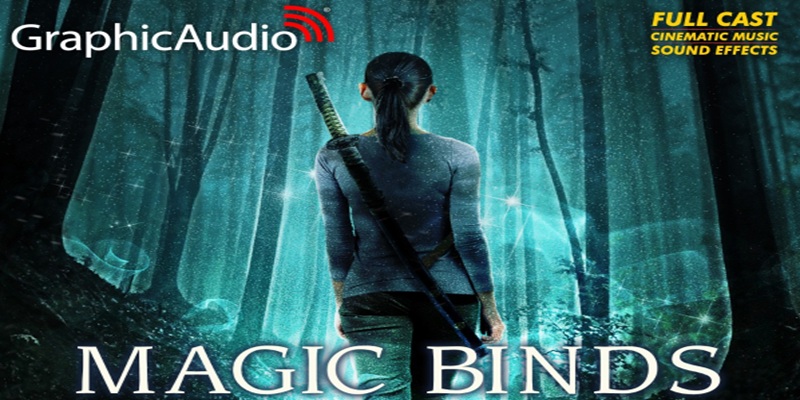
The Magic Binds full cast dramatized adaptation will be released on Tuesday, March 25th. The preorder is available on the Graphic Audio website, as well as on Audible and all the other usual third party retailers.
Of course, we got sample goodies!
What do you mean, ‘do I need cake right now‘? Kate. Beloved. We ALL need cake right now.
The three Queens guarding the line of Shinar – this Mishmar scene always gives me Canada goose bumps.
There is a third official sample on the preorder page I linked above: Kate and Curran visiting Roman about their wedding. Wedding planner shenanigans: engaged!
The next GA Ilona Andrews releases are:
Burn for Me, Hidden Legacy 1 on April 25th. You can also find find it for preorder on Audible etc.
Magic Triumphs, Kate Daniels 10 on May 20th – there is an update to the date here, it was previously set to come out on May 2nd, but the script is just too epic and Nora never lets a project be just good when she can make it amazing. A spoonful of sugar, intense editing, sound design and lots of loving work makes the final battles and psychotic ancient dragons go down! Ehhh, you know what I mean. Neig wishes. Preorder should go live on third party retailers sometime next week.
I’ve seen some concerned comments wondering how much content will be abridged from Magic Triumphs and Burn for Me because the length of the traditional audiobooks and the length of the dramatized adaptation always appear to have several hours of difference.
Having pored over both scripts, I’m happy to confirm the answer is: virtually nothing was cut! Those were in fact Nora’s first words to me when we started discussing Magic Triumphs, and who can blame her? Certainly not us hehe.
The differences in duration come mainly from the fact that animated dialogue has a different rhythm than a single narrator reading. Dramatized battle scenes, for example, rely a lot more on dynamic back and forth and the majority of GA actors are really embodying the snappy deadpan Ilona and Gordon wrote for their characters. Renee Raudman has her own signature cadence, which is the favourite of so many, but I know a lot of readers prefer to increase the speed of traditional audio.
Audio effects and interpretation can also supplant certain descriptive passages and action tags, with no difference to content. We can hear that the actor is laughing while delivering the line, or that the birds are singing while a conversation is taking place, the narrator doesn’t have to specify it to us.
You can read more about the adaptation process in previous interviews with members of the Graphic Audio team here and here.
I have covered in more detail how to buy and the accessibility of the GA app in this post, which you can also supplement with the Graphic Audio Help FAQ on their website.
The post Magic Binds Samples from Graphic Audio first appeared on ILONA ANDREWS.
Spotlight on “The Mysterious Bakery on Rue de Paris” by Evie Woods
Nestled among the cobblestone streets of Compiègne, there existed a bakery unlike any other. The…
The post Spotlight on “The Mysterious Bakery on Rue de Paris” by Evie Woods appeared first on LitStack.
On McPig's Radar - They Bloom at Night
 They Bloom at Nightby Trang Thanh Tran
They Bloom at Nightby Trang Thanh TranA red algae bloom has taken over Mercy, Louisiana. Ever since a devastating hurricane, mutated wildlife lurks in the water that rises by the day. But Mercy has always been a place where monsters walk in plain sight. Especially at its heart: The Cove, where Noon’s life was upended long before the storm at a party her older boyfriend insisted on.
Now, Noon is stuck navigating the submerged town with her mom, who believes their dead family has reincarnated as sea creatures. Alone with the pain of what happened that night at the cove, Noon buries the truth: she is not the right shape.
When Mercy’s predatory leader demands Noon and her mom capture the creature drowning residents, she reluctantly finds an ally in his deadly hunter of a daughter and friends old and new. As the next storm approaches, Noon must confront the past and decide if it’s time to answer the monster itching at her skin.
Of Men, Monsters, and Little People
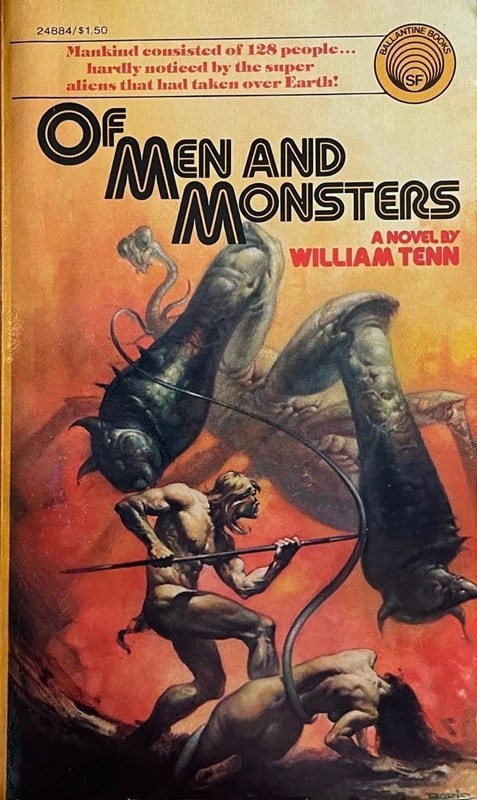
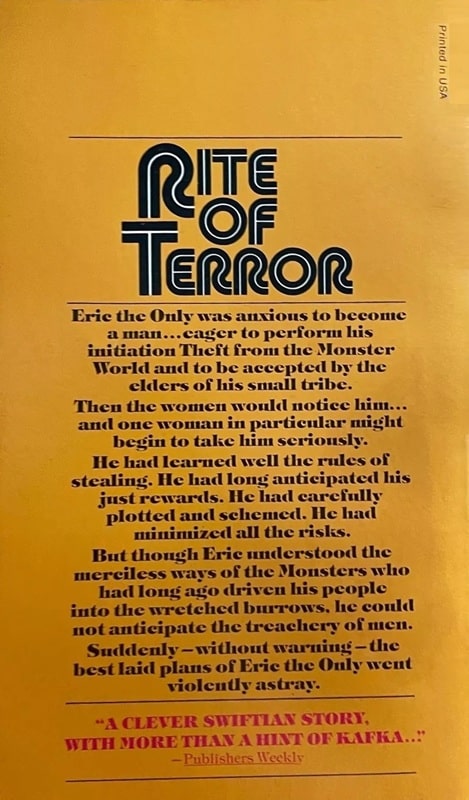
Of Men and Monsters, by William Tenn
(Ballantine Books, December 1975). Cover by Boris Vallejo
After posting about The Borrowers by British author Mary Norton (1903 -1992) last week, several people mentioned other books and movies with similar kinds of themes — little people living in the houses of big people. I thought I might take another post to discuss a few other examples from my own book collection.
First up is series by American author John Peterson (1924 – 2002). The first one was just called The Littles and was published in 1967, 15 years after The Borrowers (1952). The Littles live much like the “borrowers. They look human except for having tails. (In films they apparently look very mouselike but that’s not the case in the books.)
[Click the images for less little versions.]
 The Littles, by John Peterson (Scholastic Books, 1991-1993 editions). Covers by Jacqueline Rogers.
The Littles, by John Peterson (Scholastic Books, 1991-1993 editions). Covers by Jacqueline Rogers.
Unlike with The Borrowers, I never heard of The Littles until I was buying books for my own son, (Josh), even though many were written when I was a kid. I stopped by Josh’s school to pick him up one day and they were having the Scholastic Book fair.
When I was a kid, we never had a fair where you could actually see the books, but we did get the order forms and I bought quite a few books through them for 25 cents or so when in grade school. I had to stop by this one at my son’s school and found out about The Littles. I bought every one they had, ostensibly for my son but at least halfway for myself. I read them all, too, although I don’t think Josh read them all.
There are a bunch of these books and more were written after Peterson’s death, but here are the ones I have. All covers are by Jacqueline Rogers, with charming interior illustrations by Roberta Carter Clark. (These are written specifically for children and I don’t think the stories are as good as in The Borrowers series, but they are fun.)
The Littles, 1967
The Littles have a Wedding, 1971
The Littles and the Trash Tinies, 1977
The Littles Go Exploring, 1978
The Littles and the Lost Children, 1991
The Littles and the Terrible Tiny Kid, 1993
In my twenties I came upon another series about tiny people. This was a trilogy by Gordon Williams (1934 – 2017) that included The Micronauts (1977), The Microcolony (1979), and Revolt of the Micronauts (1981) — all from Bantam Books.
 The Micronauts by Gordon Williams (Bantam Books, August 1977, May 1979, and August 1981). Covers by Boris Vallejo, Lou Feck, and Peter Goodfellow
The Micronauts by Gordon Williams (Bantam Books, August 1977, May 1979, and August 1981). Covers by Boris Vallejo, Lou Feck, and Peter Goodfellow
These are SF novels, not to be confused with the toy series and comic book series from Marvel with the same name — which I’d never heard of until I started looking into stuff for this post. The difference here is normal sized people are cloned at 1/8th their natural size in order to deal with a catastrophic future where most natural resources have been exhausted. The experiment is set up in a controlled environment but things soon get out of control.
I liked all three very much and they had some cool covers. The Micronauts has a Boris Vallejo cover and interior illustrations. The Microcolony has a wonderful Lou Feck cover that I love. Revolt has a Peter Goodfellow cover.
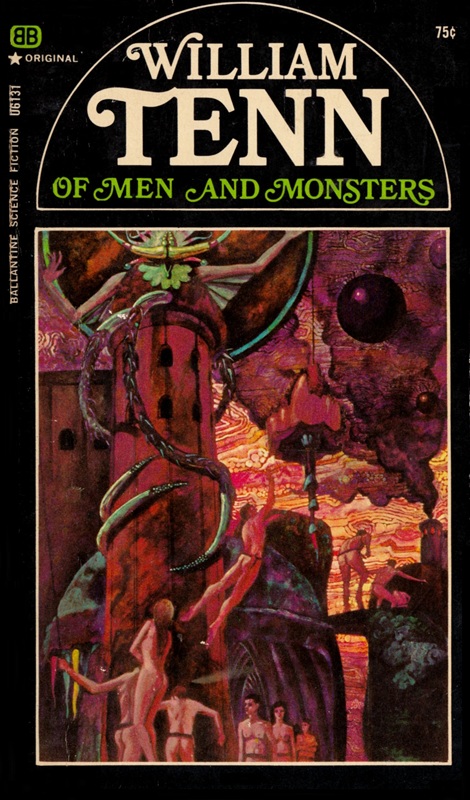
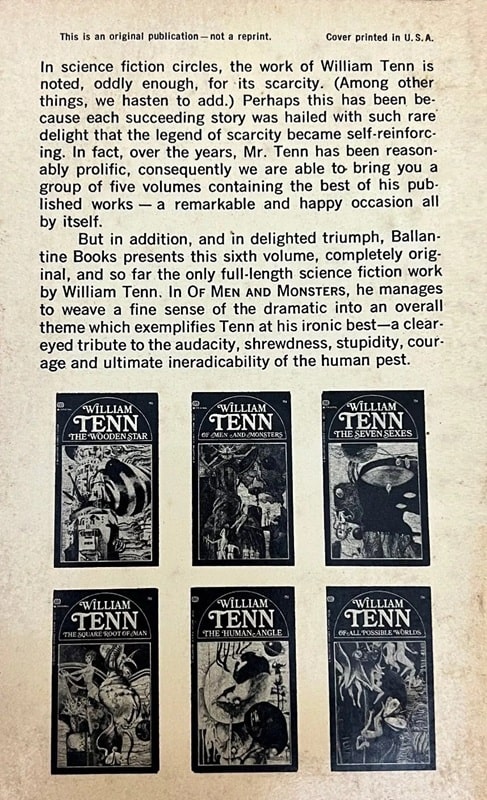
Of Men and Monsters, by William Tenn
(Ballantine Books, June 1968). Cover by Stephen Miller
The last book I’ll review today is one of the first adult SF novels I ever read, Of Men and Monsters, by William Tenn (1920 – 2010). It’s still a fond memory. Tenn was the pseudonym for a British born author named Phillip Klass, although he moved to the US before he was 2. The book was published in 1968 and I read it in a library edition, but years later I bought a Del Rey printing with a great cover by Boris Vallejo (see top).
This one has its own twist on the theme. The people are normal sized, but they are survivors of an invasion by gigantic aliens so huge that the humans can live like mice in their walls. I just loved it, and found out from Adam Tuchman on Facebook that it was originally published in a shorter version in the October 1963 issue of Galaxy, called “The Men in the Walls.”
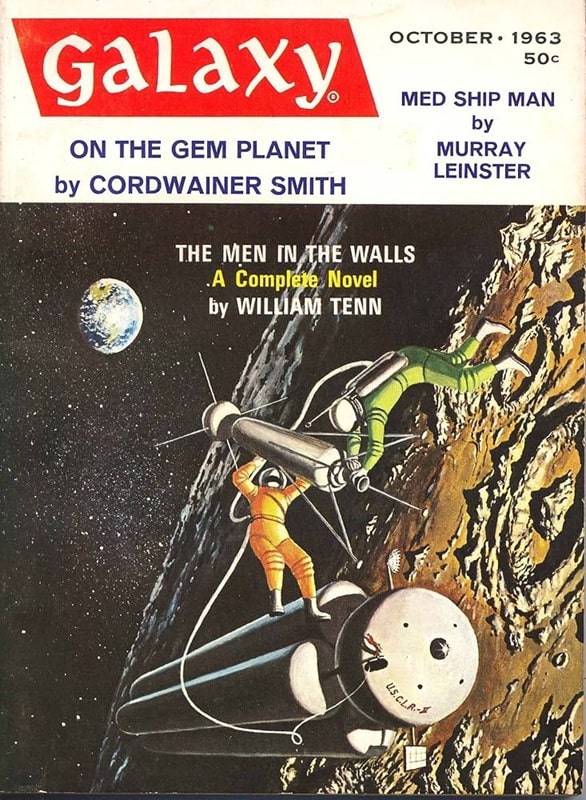
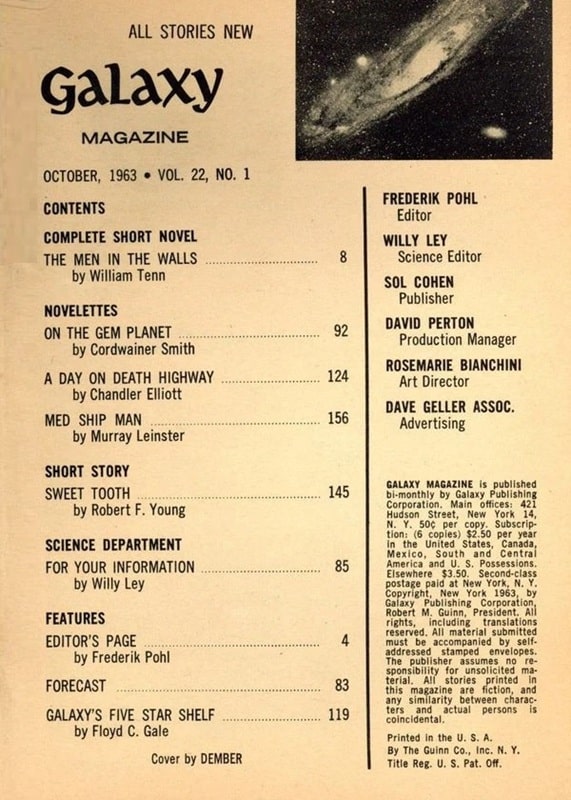
Galaxy, October 1963, containing “The Men in the Walls,” plus stories
by Cordwainer Smith, Murray Leinster, and more. Cover by McKenna
I’ll note that the ending Of Men and Monsters takes us into Sword & Planet territory.
There are plenty more I could talk about here, such as Lindsay Gutteridge’s Cold War in a Country Garden Trilogy, and Ben Sheppard reminded me of an awesome story called “Surface Tension” by James Blish, which deals with the miniaturization theme. There’s Asimov’s Fantastic Voyage, and even the movie Honey, I Shrunk the Kids, but this post is getting long as it is.
Charles Gramlich administers The Swords & Planet League group on Facebook, where this post first appeared. His last article for Black Gate was And Now For Something Completely Different: The Borrowers, by Mary Norton.
Cast by Flames audio pre-order
7 Author Shoutouts | Authors We Love To Recommend
Here are 7 Author Shoutouts for this week. Find your favorite author or discover an…
The post 7 Author Shoutouts | Authors We Love To Recommend appeared first on LitStack.
The Naturalist Society - Book Review
 The Naturalist Society (The Naturalist Society #1)by Carrie Vaughn
The Naturalist Society (The Naturalist Society #1)by Carrie VaughnWhat is it about:In this magical tale of self-discovery from New York Times bestselling author Carrie Vaughn, a young widow taps into the power that will change the world—if the man’s world she lives in doesn’t destroy her and her newfound friends first.
In the summer of 1880, the death of Beth Stanley’s husband puts her life’s work in jeopardy. The magic of Arcane Taxonomy dictates that every natural thing in the world, from weather to animals, can be labeled, and doing so grants the practitioner some of that subject’s unique power. But only men are permitted to train in this philosophy. Losing her husband means that Beth loses the name they put on her work—and any influence she might have wielded.
Brandon West and Anton Torrance are campaigning for their expedition to the South Pole, a mission that some believe could make a taxonomist all-powerful by tapping into the earth’s magnetic forces. Their late friend Harry Stanley’s knowledge and connections would have been instrumental, but when they attempt to take custody of his work, they find that it was never his at all.
Tied together by this secret and its implications, Beth, Bran, and Anton must find a way for Beth to use her talent for the good of the world, before she’s discovered by those who would lay claim to her rare potential—and her very freedom.
What did I think of it:I got this book as a present from Jeffe, and it's a signed copy as well!I have read books by Vaughn before - Kitty Norville, Martians Abroad - and I really enjoyed those. But I can't say Vaughn was on my watch list. I can tell you that this book changed that!
In this alternate history there's a sort of magic - taxonomy - where if you name something, and know it, you can use the magic/power of that thing or animal. I loved learning more of this magic and how the characters used it in different ways.
As for the characters: I loved Beth from the start. She's smart, knows more about birds than a lot of experts, and managed to teach herself taxonomy, but because she is a woman she is barred from the spaces where she could do something with her knowledge. She managed to get some of her work out there under her husband's name, who (all other stuff he did aside) at least encouraged her work. But when he dies, Beth is back at square one.
Enter Bran and Anton, who were friends with Beth's husband and want to use his work for their own goals.
I really loved Anton as well. He's pragmatic, charismatic, and keeps going to get things done. Bran... still needed to grow up a bit, despite being old enough he should have already. Still I liked him well enough.
I was totally invested in Beth freeing herself from the chains forged by society and find her way. When she befriends Bran and Anton, I rooted for the three of them to realize their dreams. Bran and Anton have a rival, who soon becomes a danger to Beth as well, making me anxious to see them get out of everything alive and successful.
I can safely say I loved everything about this book, even when it made me cry. I can't believe I hadn't seen it mentioned before and only discovered it when I got it as a present. Is it for everyone? I can see how people think it's too dry, there's lots of talk about the science of taxonomy, and there's bits about famous taxonomists at the end of most chapters, but I loved these parts of the book as well (yup: Nerdy Factoids McPig, and proud to be).
You bet I'll be on the lookout for the next book in this world.
Why should you read it:It's a wonderful Alternate History Read.
Book Review: The Buffalo Hunter Hunter by Stephen Graham Jones
I received a review copy from the publisher. This does not affect the contents of my review and all opinions are my own.
 The Buffalo Hunter Hunter by Stephen Graham Jones
The Buffalo Hunter Hunter by Stephen Graham Jones
Mogsy’s Rating: 4.5 of 5 stars
Genre: Horror
Series: Stand Alone
Publisher: Saga Press (March 18, 2025)
Length: 448 pages
Author Information: Website
At its heart, The Buffalo Hunter Hunter may be a vampire novel, but it’s about so much more that calling it such would be doing it a great disservice. Yes, the story involves undead, blood-drinking creatures. However, it is also a meditation on the scars of history, and, like any good western, features a tale of vengeance. In short, Stephen Graham Jones has created something far more complex than your typical vampire horror here.
The novel opens in 2012 with an introduction to Etsy Beaucarne, a junior professor at the University of Wyoming who is desperately looking for a way to revitalize her career. Her opportunity arrives when she comes into possession of a long-lost journal belonging to her great-great-grandfather, a Lutheran priest who lived in the American West in the early 1900s. Within its pages, Arthur Beaucarne had transcribed a stunning confession from a Blackfeet man named Good Stab who claimed to be an immortal vampire.
Through Good Stab’s recorded testimony, readers are plunged even farther back in time to the brutal winter of 1870, when US Army soldiers carried out the Marias Massacre that left hundreds of his people dead. Good Stab, one of the few survivors, swore that he would get his revenge, spending the next few decades hunting down those responsible. Yet his survival came at a heavy price. After losing his family, his home, and even his place in the world, Good Stab’s path changes his life forever. Possessed of both immense power and an insatiable hunger, he knows what happened to him is a curse—but it’s also one he can wield as a weapon against those who destroyed everything he once knew.
From the start, The Buffalo Hunter Hunter’s frame structure brings to mind Dracula, which is not the only nod to the classic. Stephen Graham Jones continues his homage with the epistolary style format, enhancing the story’s eerie, almost folktales-y like atmosphere. Despite its supernatural elements though, some of the most disturbing aspects of the novel are the parts rooted in reality—particularly the history of Indigenous genocide and the annihilation of the buffalo.
In Good Stab’s account, he wasn’t merely seeking revenge for the slaughter of his people, but also for the destruction of his whole way of life. His vampirism not only holds him forever in a state of constant hunger but also traps him in an endless cycle of rage and grief. Immortality offers him no peace but instead forces him to witness more loss as the years stretch on. This makes Good Stab one of the most interesting and tragic characters I’ve ever encountered. He isn’t a hero or a villain—just a man and then a creature driven by circumstance.
Like most vampire stories, The Buffalo Hunter Hunter is unsurprisingly violent and gory. That said, its horror manifests itself in lowkey, slow-burn ways as well. The author’s prose captures the harshness of the frontier, an unforgiving landscape where you are constantly struggling to survive. Though the pacing may be demanding at times, this story simply must be experienced on its own terms, requiring your full attention. With its mix of so many elements from history, mythology, and horror, this is not a book to be rushed but to be absorbed slowly, allowing its haunting themes to fully take hold.
If I had any criticisms at all, it would be that some parts of the story become repetitive at times, especially with regards to the interactions between Arthur and Good Stab. While this back and forth served to reinforce the narrative style, I think the novel could have packed the same emotion punch without being quite so long, and some streamlining would have been beneficial.
In the end, I absolutely loved The Buffalo Hunter Hunter, as in, it just might be my favorite book by the author yet. While it’s not the easiest read, the end results are satisfying and rewarding. Stephen Graham Jones’ storytelling skills are on full display here, and it would make me very happy to see him tackle more historical horror like this sin the future. Granted, I haven’t enjoyed everything he’s written, but when he’s good, he very good. And with this novel, he’s proven once again why he is one of the most important voices in the genre today. If you enjoy horror with depth, especially one exploring a dark chapter of American history, this is a must read.
![]()
![]()
New Release – Blood Skye
The only choice is surrender. In my world, magic and danger go hand-in-hand. It has from my earliest memory. Magic was currency, and if you have it, you have power. I was shaped by some of the most influential Druids into a lethal weapon. Their weapon. Until the night they betray me—and I wind up...
The post New Release – Blood Skye appeared first on Donna Grant.
All the Questions
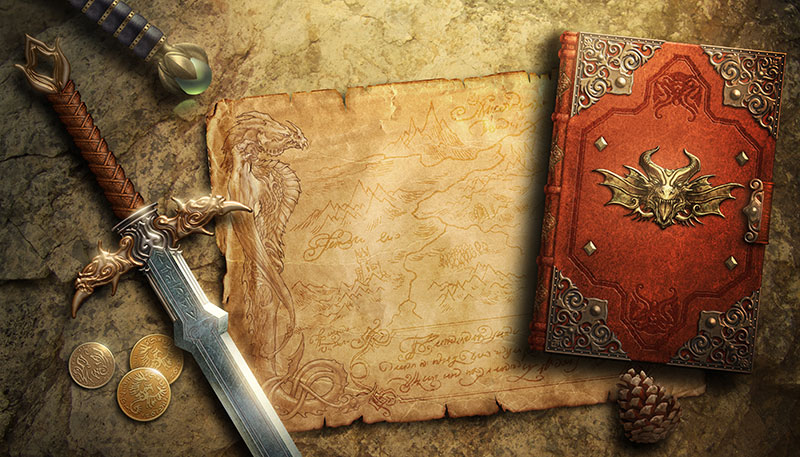
Mod R presented me with a list of questions. Let us get to it.
When will the preorder be availlable?
We don’t know. Well, that was easy. The usual MO is to wait until the cover is done because people tend to preorder in higher numbers once the cover is up. Maybe having the cover is proof that the book exists?
When will the cover be available?
We don’t know that either. I’m knocking these out of the park today.
Can you make Tor publish it faster?
Hahahaha. No.
Will there be opportunities for signed books or bookplates?
Absolutely.
Will there be a e-book and audio version or just print?
There will be all the things. Tor is fully behind this release. So here is how this book sold: it went to several publishers on Thursday and on Friday morning Tor came back with an offer so impressive, that our agent called for an emergency zoom meeting to discuss it. They read it that evening, and they really wanted this book. So there will be everything: ebook, print, audio. The whole kaboodle. We’ve discussed maps and extras.
Will there be special editions/ hardcovers/ book boxes, since it’s Tor? We want all the special editions (Fairyloot, Broken Binding, Forbidden Planet and Illumicrate mentioned specifically)
We don’t know. But our personal feeling is that yes, there likely will be special editions. We are working on some extra scenes, deleted scenes, and so on.
Can you share a cover artist at least? Are you using Luisa Preissler?
We don’t know who the cover artist is. No idea. It probably will not be an object cover, simply because there have been so many of them that it’s hard to come up with a new distinct image. The direction is more toward illustrative rather than graphic. And that’s all I can say.
A note about Luisa Preissler: Luisa recently changed her creative direction. She is taking a break from covers and is working on landscapes instead. She now paints beautiful gouache art. Here is that story in Luisa’s own words and images, and here is how her first gallery went.
(She is teaching a class on her Patreon and I really want to take it. I haven’t yet, because I paint very, very badly. Like hilariously badly. Only my singing is worse.)
So although Hugh 1’s cover is in desperate need of a makeover and we would love her to do both Hugh 1 and 2, we are not sure that she will have an opening in her schedule. We will definitely bring it up, but we might have to go in the new direction.
And now you know why sometimes we do things other than sequels to the beloved series. Artists, writers, and musicians don’t usually stay in one lane. Creativity is a layered, branching expression of one’s inner self. As we go through life, the direction of creativity changes because we are affected by events that happen to us and the world around us. It is the natural evolution of us as human beings.
Will it be translated into French/ German/ Spanish etc?
Probably. Let me tell you a little bit about foreign rights so you will have a cool industry insight.
Twice a year, the publishing world gets together at two major book fairs: London and Frankfurt. The Frankfurt one is held in Germany and it is the largest book fair based on the sheer number of publishers who attend. It usually happens in October. London Book Fair, which is almost as large, is happening this week, March 11-13. It is held in London, to no one’s surprise, and both our agency and Tor will have a presence.
These are not reader-centric events, but rather events where publishers and agents from all over the world get together and talk about upcoming projects and sell and buy foreign (to them) rights.
While we don’t expect to have offers from foreign publishers, because the final edit was just turned in and hasn’t been accepted yet, This Kingdom Will Not Kill Me, and this was so long to type, let’s call it This Kingdom for short, This Kingdom will be “a topic of conversation.” At least that’s what our agent told us.
To sum up: yes, we expect interest from foreign publishers and we will let you know what is happening with that when we know something ourselves.
Does that mean you are going to London?
No, London Book Fair is not for the authors. But we would love to go to London. And Ireland.
Why are you using comps to announce the book?
We are not. Tor is using comps to announce the book. Comps are mostly for industry insiders to let them quickly identify what the book is about. For some reason, you guys are really concentrating on them, but it is a minor detail.
Will the series be called Maggie the Undying?
Yes. We all loved Maggie as a title, but unfortunately it’s really hard to go to book 2 with it. Something has to beat out the Undying. And then you end up with Maggie the Undaunted or something equally silly.
Is it a series or a standalone?
It is definitely not a standalone. The original plan was for three. The caveat here is that Book 1 ended up being enormous, so Book 2 will likely be equally so, and we may pack the story into two books instead of three. But for now, three is where it is.
Are the 808 pages Word pages or formatted pages and what will be the final length of the book?
So if you take Magic Bites and Magic Burns and put them together, that will be about the right thickness. Typical KD was 90-95K, because the publisher wanted it that way, and this is around 180K.
Is there romance or isn’t there? How spicy is it?
It has strong romantic elements, meaning that you can yank romance out of the book and it would be still make sense. Like Kate books – you can remove Kate and Curran’s relationship and they will still make sense. The romance is slow burn. You will just have to read it.
So is this a twist on the concept from Omniscient Reader’s Viewpoint?
Oh good question. Omniscient Reader’s Viewpoint is a manhwa, a Korean comic, and a webnovel.
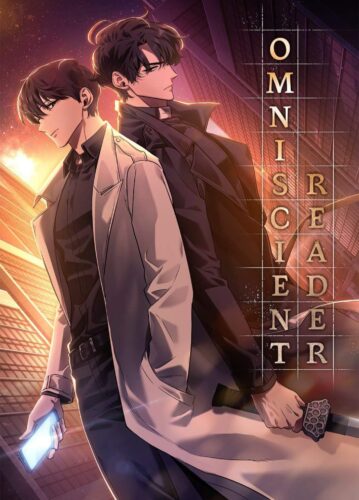
The manhwa is available on Webtoon and the official translation of the webnovel might have been up for preorder some time recently. Not sure about that one.
ORV throws the reader into his favorite book as a character. He starts tugging at strings and influencing events. This is a common trope used by a lot of portal (isekai) manhwa and anime.
The variation on that is being thrown into a video game. If you are in the market for an anime with that theme, there are so many, but I want to mention two here just for fun. First, My Next Life as a Villainess: All Routes Lead to Doom! The heroine ends up stuck as a villainess in the dating video game with hilarious results. Vegetables! All the vegetables ever.
The trailer, which is below, doesn’t do it justice. This anime is available on Crunchyroll. Although the trailer is subbed, the anime is dubbed and the dub is pretty good. (Link for newsletter readers.)
Once you watch that, there is this gem in Hidive.
From Bureaucrat to Villainess: Dad’s Been Reincarnated! has the exact same premise, but he is a middle aged dad, which leads to ridiculous moments, such as him telling another girl that her presence in the magical academy could mean only one thing – her parents love her very much and they want her to succeed.
But back to the Omniscient Reader, yes, This Kingdom has the similar premise of a reader being thrown into a book and changing events as they unfold. But Omniscient Reader is structured like a LitRPG, meaning it has a video-game like narrative. The character goes through a sequence of escalating fights with emphasis on classes and skills. It has more in common with Solo Leveling than Maggie.
(That genre is super fun. In fact, we are working on a very derivative novella in that genre on and off in our spare time because it’s been nagging at me and Gordon suggested that we need to download it onto page and out of my brain.)
This Kingdom has zero LitRPG elements. It is all about political intrigue and fantasy kingdoms, which is where the GOT comparison comes from. There are no defined classes or skills, there is no system window, etc. There are heists and murders and to quote Maggie, “Deadly swordmasters, thieves prowling through moonlit streets, dark magicians, ruthless nobles, hideous monsters…” It’s is meant to be an archetypical fantasy.
So a little bit different. A better comp would be the Lout of Count’s Family, which is available on Tapas. Highly recommend. And now we have it in novel form, available on Amazon and presumably everywhere else. Tada!
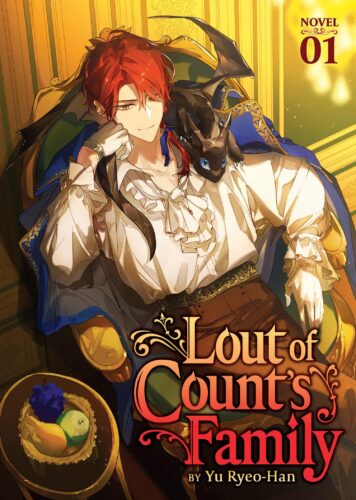 Lout of Count’s Family
Lout of Count’s Family
I haven’t read the novel, but the manhwa is awesome. He is the best dragon dad ever.
Since Maggie is getting sprayed edges, is there any news for a Kate hardcover/sprayed edges, uniform box set release?
We don’t know anything about sprayed edges or where they will go or what they will look like. We first saw it on Tor’s announcement.
We’ve brought up the possibility of reissuing KD in hardcover to Ace, which originally published that series. They are not interested in pursuing that at this time. As much as we all love Kate, it’s an older series.
How are you feeling about all of this?
Cautiously excited. For me there is a little bit of a disconnect, because in my head Maggie was a small weird book, and now This Kingdom reads like a medieval thriller. The book has grown bigger and more vivid. But despite the many editorial passes – or maybe because of them – I love the story. I love the world. I love Maggie and her fierce fandom heart. We both hope you will enjoy reading it as much as we enjoyed writing it.
The post All the Questions first appeared on ILONA ANDREWS.
SPFBO Finalist Review: The Tenacious Tale of Tanna the Tendersword by Dewey Conway & Bill Adams

ABOUT THE AUTHORS:
Bill: When not writing, Bill is a product manager for a company that tests food using analytical chemistry and microbiology. Bill currently lives in the greater Chicago, IL area with his wife, goblin (aka toddler) son, & daughter.
Dewey: When Dewey isn’t heads down into drawing or writing, he works as an instructional designer for a major learning management systems company developing online courses. Dewey lives north of Houston, TX with his wife and two dogs while his adult children are off on their own.
Find them online: The Willow Wraiths
The Tenacious Tale of Tanna the Tendersword links: Amazon, Goodreads
ESMAYSometimes you just want to turn off your brain and escape into a wild adventure, and that is exactly when books like The Tenacious Tale of Tanna the Tendersword can come to the rescue. It’s a tongue-in-cheek middle grade fantasy full of action, whimsy and humour that will undoubtedly speak to the hearts of many fantasy lovers, even if it didn’t totally manage to capture mine.
Now, when you have a story with the premise of a 13-year-old grumpy chronicler in training and a hyperactive 12-year-old would-be-champion setting out on a quest guided by a peg-legged, sword-wielding rooster to help save a crying mushroom from an evil sorceress in a haunted forest, you know it’s gonna be a wild ride. And honestly, The Tenacious Tale of Tanna the Tendersword is everything it promises to be, and I found myself effortlessly breezing through the pages.
Despite what the cover and title might make you believe, Tanna is actually not the main protagonist/narrator of this heroic tale (thank all that is holy, girlie and I did not get along), and instead we see it all unfold through the eyes of the grumpy Galdifort. For me, this worked extremely well, especially because I deeply related to his utter exasperation with Tanna’s annoyingly loud, excitable, and slightly brash personality. To me, he almost read a bit neurospicy (though that is never confirmed in the text), and I found it highly amusing to see him desperately trying to stick to the rules while Tanna just ran into chaos every opportunity she got.
That said, I personally felt like there was a lot of missed potential for more nuance, depth, and emotional complexity for these characters, and I soon found myself having a hard time staying engaged in their adventures because I just didn’t care for them. Especially for a story that challenges these young characters in so many unexpected ways, I found the lack of character development to be a bit disappointing.
Don’t get me wrong, not every story needs to be a deep character study or deliver deep philosophical messages, but I think other middle grade stories I have read (like Amari and the Nightbrothers or Nevermoor) just set the bar way higher for me in terms of impact and nuance. Moreover, I felt like this book sometimes had a bit of an identity crisis, with extremely youthful storytelling (I can’t see another CRASH!, BOOM! or ‘fopdoodle’) being mixed with long, convoluted sentences and hectic, violent action sequences that felt confusing regardless of the age of the intended target audience.
Maybe I just wanted this story to be something it was never meant to be, and I have a feeling my little quibbles won’t really bother most other readers. Plus, I think it really shows that the authors had a blast writing this story, and I can’t sit here and pretend that the irresistible chaotic charm of The Tenacious Tale of Tanna the Tendersword didn’t get to me in the end. I absolutely loved the illustrations, the mystery surrounding the disappearance of Galdifort’s aunt and her legendary champion had me eagerly turning the pages, the tongue-in-cheek way that the authors poke fun at the silly conventions of the fantasy genre had me cackling quite a few times, and honestly… how can you not love a peg-legged rooster wielding swords and spitting fire?; Peggs is the true MVP!
And although this adventure wraps up in a satisfying (if slightly rushed) way, the enticing epilogue promises much more danger, mayhem and fun to come for our dynamic duo of unlikely heroes. While I personally didn’t end up loving this story as much as I desperately wanted to, I have a feeling that The Chronicles of Tanna the Champion by Galdifort Quillpen will make fans come back time and time again for more exciting, heartwarming, feel-good adventures to get lost in.
LUKASZ
The Tenacious Tale of Tanna the Tendersword tries to be a quirky, offbeat fantasy romp with an eager heroine, a reluctant sidekick, and a peg-legged rooster who may or may not be hiding a blade. It’s got humor, it’s got adventure, and it’s got an ominous creeping fog. On paper, this sounds like a fun, middle-grade fantasy. In execution? I found it a bit underwhelming.
The biggest issue is that the book doesn’t quite commit to anything fully. The humor is present but not sharp enough to be truly funny. The adventure is in motion but rarely feels urgent or exciting. The magic system has some interesting ideas - time-based gods, song magic - but the story barely scratches the surface. Even the villains, including the ominous Thistle Willow and her foggy menace, feel more like background threats than real forces of tension. Galdifort’s grumpy Chronicler POV is a nice twist, but it doesn’t do enough (deeply subjective) to elevate the story beyond standard fare.
Younger readers new to fantasy might enjoy the lighthearted tone. Since I'm usually looking for something with more depth or originality, this one didn’t leave much of a lasting impression.
OFFICIAL SPFBO RATING

Learning to Live and Love | “Because We Must” a Memoir
Because We Must by Tracy Youngblom is a candid exploration of motherhood and grief Please…
The post Learning to Live and Love | “Because We Must” a Memoir appeared first on LitStack.
Teaser Tuesdays - What Feasts at Night
 Autumn was nearly spent, which means that many of the trees had lost their leaves. you might think that would mean that the woods had opened up, but if you think that, you have likely never been to Gallacia.
Autumn was nearly spent, which means that many of the trees had lost their leaves. you might think that would mean that the woods had opened up, but if you think that, you have likely never been to Gallacia.(page 1, What Feasts at Night by T. Kingfisher)
---------
Teaser Tuesdays is a weekly bookish meme, previously hosted by MizB of Should Be Reading. Anyone can play along! Just do the following: - Grab your current read - Open to a random page - Share two (2) “teaser” sentences from somewhere on that page BE CAREFUL NOT TO INCLUDE SPOILERS! (make sure that what you share doesn’t give too much away! You don’t want to ruin the book for others!) - Share the title & author, too, so that other TT participants can add the book to their TBR Lists if they like your teasers!
SPFBO Finalists Interview - Dewey Conway & Bill Adams, Co-Authors of The Tenacious Tale of Tanna the Tendersword

ABOUT THE AUTHORS:
Bill: When not writing, Bill is a product manager for a company that tests food using analytical chemistry and microbiology. Bill currently lives in the greater Chicago, IL area with his wife, goblin (aka toddler) son, & daughter.
Dewey: When Dewey isn’t heads down into drawing or writing, he works as an instructional designer for a major learning management systems company developing online courses. Dewey lives north of Houston, TX with his wife and two dogs while his adult children are off on their own.
Find them online: The Willow Wraiths
The Tenacious Tale of Tanna the Tendersword links: Amazon, Goodreads
Hello guys, thanks so much for joining us! Would you tell us a little about yourselves, and what made you want to start working together?
Bill: Hallo! Thanks for having us. Not only are we super grateful to even be named a finalist in SPFBOX (and the first ever middle grade book!), we are thankful y’all even want to chat with little ol’ us.
But to answer your question, I’m Bill Adams and I’m a middle grade and adult SFF writer. Aside from The Tenacious Tale, I have an adult dark fantasy series called The Divine Godsqueen Coda that I’ve been working on for mannnny years, and just released the first book, The Godsblood Tragedy, this past summer.
Dewey: Hello, I’m Dewey Conway and I’m a middle grade writer and illustrator. TTToTTT is my first book, but I also illustrate a little on the side and have been starting to branch out into commissioned art.
Bill: It’s an interesting journey we had together. We first started off as critique partners. I sent out the call in 2017 on social media and Dewey was one of the first to answer it. At the time, I was working on a draft of TGT and Dewey was on a first draft of TTToTTT. Not only did we click right away on a writing basis, but on a personal one too. We’ve become very close friends over the years.
Dewey: Arus brought Bill into my life, for sure. We have a dynamic that creatively works really well.
Bill: We really do work together well. I’ll answer it a bit further below, but I truly believed in the story Dewey had started. There was so much there, so many great things about it. I knew that as a middle grade age reader, I would have eaten this story up. I also knew that Dewey was getting a little discouraged by the querying process and seeing as we collaborated really well on altering some of the story over the years, I basically begged him to let me take a crack at an edit of it.
Dewey: I was done. This story and the characters within (especially Galdifort) are shards of my soul, so to have it rejected time after time by agents during querying was discouraging, for sure. I had shelved it for a bit before Bill coaxed me into bringing it back out. We’ll get more into that later.
Bill: It was a journey for sure to get to the self-pub point, but there’s no doubt in my mind, we put out the best story we could, one that would draw in readers not only at middle grade age, but adults too.
Collaborative work is… Well, it’s not for everyone. But you’ve pulled it off. What does it take to successfully co-write a novel? And what was the process for The Tenacious Tale of Tanna the Tendersword ?
Bill: The key for us was trust. Because we started off as critique partners, we learned each other’s styles. Learned how to give feedback. But most importantly, we learned how to bounce ideas off of each other. For me, trusting in that other person implicitly is the biggest way to be a success, because let me tell you, this self-pub industry is not really set up for co-authorship. The systems/processes in place are difficult enough for one author, let alone two.
Dewey: Collaborative work is actually simple. The issue comes with ego. That’s where collaborative work derails. Bill loved this story, loved all the characters, brought to it elements that were missing, and I knew I could trust his intentions. And he knows he can trust me…we’re in this together, baby!
Bill: Ha! Very true, very true. But to bring it back some, early on, the draft Dewey shared with me had spots where I really thought changes could make it even better, one being that Tanna (a girl) was originally Tanner (a boy). After reading the whole draft, I came to Dewey with the idea of swapping gender because we always see boy heroes in stories, and if he wanted to appeal to a larger audience, I felt having a girl be the hero (while keeping Galdifort the grumpy chronicler a boy), the story would really open up for some excellent character dynamics and growth. And Dewey really seemed to agree. This is what I mean by trust. Dewey knew I had the best interest of the story at heart.
Dewey: This was a huge change, and I had to really mull it over, but it just made sense. Tanna was Tanner, but when we shifted him over to Tanna, everything just clicked. The dynamic we needed between Galdifort, who is perpetually grumpy and doubting, with a girl who was genuinely, over-the-top optimistic about everything in life was what the story needed.
Bill: Fast forward to Dewey agreeing to share his creation, we began to outline what we would need to do, not only changes, but how we can successfully launch this story.
Over the years of my writing journey, I really honed my editing skills, so I took our draft and ideas and went to work doing a full-blown edit from the ground up. I aimed to maintain the middle grade voice Dewey is amazing at, plus his penchant for humor and inherent grumpiness in Galdifort, and meld it with a more streamlined story arc, elevating the prose just a smidge so it would also draw in adult readers, while ironing out any kinks.
I’m also a project manager by trade, so I’m very diligent on timelines, on organization, etc. I may dislike it, but I also had been quite active on social media (but really love the indie community there!), so I took on a more ‘business’ role while Dewey remained fully on the ‘creative’ side.
Dewey: This story would not have happened without Bill. 100%. It would be living in my files somewhere under a folder title “Oh Well…”. Bill says he “honed [his] editing skills”...let me clarify. He is THE editor of editors. His eye for story, sense, emotion, and what feels right are beyond scope. BUT the more important part of this is his delivery. He edits with the objective of making the story the best it can be. And, to be honest, I’m a 100% sensitive creative soul, so taking criticism of my work is hard sometimes. I think Bill is one of 3 people that I can take authentic criticism from and listen to that, even if it fundamentally changes the outcome of the work. He is authentic, and this authenticity is a key to our collaborative success.
When Bill finished that final edit sweep, and I re-read it, I went to work on the illustrations and cover. I love drawing, and these characters have always had a certain feel to them that I love to illustrate. Bill had a plan, and we decided to publish on my birthday (April 2) back in January of this year, so I had to get to work on the illustrations, which was a challenge to complete. But nothing has been more satisfying than getting the book out, having it received well, and (most importantly) read by young readers who may now go on to read more fantasy!
Do you have a day job? If so, what is it?
Bill: As mentioned, I’m a project manager, and I work for a company that does food chemistry on food and beverage products. I also had a teaching license in ages past.
Dewey: I am currently an Instructional Designer for a major Learning Management platform, but before this, I taught 5th and 6th grade students for a gazillion years.
Who are some of your favorite writers, and why is their work important to you?
Bill: First and foremost is Richard Adams (no relation sadly) and his seminal work Watership Down. It is the first ‘big’ book I ever read, and he once said something along the lines of ‘a good book is one that is enjoyed when you are six and when you are sixty’ and this really rang home for me as an aspiring writer, especially in the middle grade level. I’m also a huge Terry Brooks fan, as his Shannara books are what got me into fantasy as a teenager in the 90s. Yes, Tolkien is the king, but without Brooks, I don’t think I’d be as big a fantasy fan as I am (I also met him a couple years back and he is one of the nicest people ever!)
Dewey: Well, I have to mention Tolkien. The Hobbit was my first fantasy book I read (I actually played Bill the Troll in a school play haha). This really got me interested in fantasy, but I tend to go for the safe fantasy, the kind that makes me wonder and isn’t necessarily filled with violence and gore. I also love Terry Brooks, but I started with his Kingdom For Sale series as well as the Krondor series by Raymond Feist. I am a huge fan of graphic novels, and Jeff Smith’s Bone is a big influence on me as an artist and author.
What do you like most about the act of writing?
Bill: Writing, and creating fantasy worlds, is my source of joy. I just love the creation part, just that feeling that anything can be done. It’s also an escape from the real world. It’s tough out there, especially now that I’m a parent, so I find solace in these made-up characters/worlds. I also weirdly enjoy the editing phase. I know most people loathe editing and prefer drafting, but I like being able to put meat on the bones and really make scenes pop.
Dewey: I love the creative process as a whole, but sometimes it can be frustrating. It’s a water well that, when it’s full, it’s go go go! I love to sit and just type it all out (more about that below), and the peaceful solitude of writing is so nice. The problem is often finding time for that peaceful solitude.
Can you lead us through your creative process? What works and doesn’t work for you? How long do you need to finish a book?
Bill: Ha, this is where Dewey and I are complete opposites. I’ll let him talk about his process, but let’s just say he’s a planner and I’m a pantster. My outlines are literally a couple of key ideas/concepts/outcomes that take place in each chapter. That’s it. I am a full-on ‘let the characters lead me’ type of writer. I know where things are meant to go, but I have to let my characters do as they will.
Dewey: I do like to plan things out. I like outlines…big chonky outlines with details and asides and rabbit holes into the arcane. I like scribbles on the side of the paper and post-it notes scattered from random thoughts during the day. I want to know the direction my characters are going, every step they’ll take to get there, the motivational arcs outlined, etc. All the stuff. Which, of course, makes this a tedious process.
Bill: When I am in the throes of writing, I can churn out 2k or more words a day and string those back-to-back. If all things are going smooth, I’ve finished 150k drafts of my adult series in a couple of months. However, life isn’t always perfect, so I’d say for me, it would take me about 6 months to have a complete first draft. But again, that’s for my adult books. I think I did the edit of Tanna in little under than 3 weeks, and that’s starting from scratch. It’ll be interesting to dive into book 2 (which we have just started recently) as it will be an all-new ballgame for both of us!
Dewey: Book 2 will be interesting to be sure. I’m super excited about it. I’m not as prolific as Bill, but I get the job done. Eventually.
What made you decide to self-publish The Tenacious Tale of Tanna the Tendersword as opposed to traditional publishing?
Bill: Oh, we tried traditional publishing… To be honest, I still don’t know how we didn’t get a single partial request on this story. It baffles me because we queried for well over a year. Well, let’s be honest, I queried and tried to keep all the rejections away from Dewey’s ears, haha. But I think I queried over 50 agents in that time and I lost count of how many manuscript wishlists had something akin to this story. Truly baffling, but hey, that’s life, right?
But I was in the same boat with my adult series, and one of my other long-time critique partners (also found from that same call out on social media) went the self-pub route, so I had a brain to pick. It just seemed like the right thing to do because I really wanted people to read more stories. So, when Tanna didn’t get a sniff from agents, Dewey and I came to the conclusion we just had to do it ourselves. I think that worked out pretty well?
Dewey: And I’m a control freak. Did Bill say that already? Haha. Bill is so good to me. He did keep the rejections hidden, which is so annoying. But back to control freak, I like to have my hands on every step of the process. Bill and I have a vision in mind, and by golly I’m not going to have someone tell me my illustration doesn’t work, the chapter font is too big, or I need to change a character’s motivation. Nope. If we’re going to do this, we tell and present the story our way.
What’s your favorite and least favorite parts of self-publishing?
Bill: Marketing, plain and simple, is my least favorite. It’s such a creative drain having to feed those algorithms just to hope that someone likes your story enough to read it, maybe give it a review/rating. It destroys my creative well. After releasing Tanna, I had my adult release to look toward, so I didn’t really notice it as much because I was editing, formatting, etc. But post release of my adult in the summer (Tanna was in the spring), I just felt so empty, so devoid of wanting to write. And that was frustrating because writing is my happy place (my favorite part of self-pub because I make the deadlines). I just knew I had to keep going each day with a post or whatever just to remain relevant when all I wanted to do was crawl into the fetal position and burrow my way out of post release blues and write.
Dewey: My favorite part of all this is when we get a review that someone’s child loved it! That makes this grumpy little heart just happy as a clam. My least favorite has to be all the technical aspects of publishing. I realize it has become simpler, but there’s a lot to it.
Why did you enter SPFBO?
Bill: I’ve been following SPFBO for about 5 years or so when I read Senlin Ascends. I had learned it was originally self-pubbed and part of this comp. When the decision was made in 2020-21 to go the self-pub route, I decided to really dive into indie books, and now, I almost exclusively read self-pubbed books. And I used this comp as a source to find good indie reads. Dewey can add something if he likes, but I was the driver of entering as he wasn’t familiar with it at the time. I knew having a middle grade book in the comp, where middle grade and YA to an extent are usually overlooked, would help get eyes on our story. I figured why the heck not.
Dewey: Bill has his finger on the pulse of the indie community. I’m not very active with social media, and he has really developed a considerable amount of respect amongst our peers. He knew about this contest, told me he was entering us, and that was it. It was only when we hit the semi-finalist stage that I perked up about it, because, to be honest, I just didn’t know how special this contest was. And it’s hard when you’ve been rejected so many times by traditional agents to have positive thoughts, so I really didn’t think we would go anywhere until I listened to our semi-finalist judge, Brian Bell, talk about Tanna and all the nice things he said about reading it. It made me pause and listen to Bill, who never stopped believing. I am just beyond grateful to think our peers find our little tale a good read.
How would you describe the plot of The Tenacious Tale of Tanna the Tendersword if you had to do so in just one or two sentences?
Dewey: In The Tenacious Tale of Tanna the Tendersword, would-be Champion Tanna teams up with her reluctant Chronicler-in-training, Galdifort Quillpen, to secure her first quest in an offbeat, pig-filled town. When an eerie fog and rumors of a dark sorceress threaten the townsfolk, the two—guided by a peg-leg rooster—must embark upon an adventure to gain a first quest and uncover the true dangers awaiting them in a shadowy, haunted forest.
What was your initial inspiration for The Tenacious Tale of Tanna the Tendersword? How long have you been working on it? Has it evolved from its original idea?
Dewey: I was initially inspired to make the story a graphic novel, way back in the late 90s. It was a tale of 3 monks who were setting out to find the perfect quill. The monks were named Tanner, Galdifort, and Lasser. Over time, that all changed until I created a comic called Monks back in the 2000s, where Tanner was the last of his kind, being pursued by an evil sorcerer’s enclave for the demon he unwittingly was holding at bay. This is the comic that introduced Cobbs and Wink, characters both still in the story. When I began teaching 5th grade students, I was inspired by that age group and the innocence of the stories they read, so I shifted and tried my hand at writing middle grade. From there, it became the backbone of what it is now.
What genre does it belong to?
Dewey: This is middle grade fantasy fiction.
If you had to describe it in 3 adjectives, which would you choose?
Dewey: Heroic
Bill: Heartfelt
Dewey: Humorous
Is it part of the series or a standalone? If series, how many books have you planned for it?
Bill: It is the first of a proposed trilogy. Without spoiling much, a Champion (what Tanna is inspired to become) has an item called an Elemstone, which gives a Champion extra powers so to speak. And as the would-be-Champion progresses, they get a piece of the Elemstone, or triad. Kinda like the TriForce in Legend of Zelda. So, three books, three pieces of Elemstone.
Who are the key players in this story? Could you introduce us to The Tenacious Tale of Tanna the Tendersword’s protagonists/antagonists?
Dewey: Let’s see…
Protagonists:
● Tanna the Tendersword: a bold, optimistic would-be-Champion determined to prove herself by finding her first quest
● Galdifort Quillpen: Tanna’s Chronicler-in-training, he’s pragmatic and grumpy who very reluctantly goes along with Tanna, he’s also our POV
● Peggs the Rooster: a mysterious, peg-legged rooster who acts as an unconventional guide, who may hold a secret himself
Antagonists:
● What’s-Her-Name (Thistle Willow): A mysterious and feared sorceress whose presence brings darkness and the ominous Fog Blight
● The Fog Blight: A supernatural, creeping fog rumored to put people under her control or lure them to their doom
● Fechus, Scratch, and Mulch: A trio of mischievous creatures known as Throgs who appear in the fog, in league with Thistle Willow
Does your book feature a magic/magic system? If yes, can you describe it?
Dewey: Yes, the magic system in this story is based on time. The gods presented are the Three Scribes, who represent past, present, and future. They are said to provide the Champions of the land of Handover (that’s the name of the kingdom) with magical might, empowered through the Elemstones (Bill mentioned that earlier). There’s also an antithesis magic, represented by our antagonist, Thistle Willow. Our next two books will dive into this a little more.
Bill: You’re forgetting song magic, Dewey! Both Thistle Willow and a secondary character named Byrna (Galdifort’s friend and crush) use songs to manipulate the things around them. We plan to explore further with this in the other two books like Dewey mentioned above.
Have you written the book with a particular audience in mind?
Bill: Kids, 100%. Brian Bell (our sub-judge on Team Chase) made a great point, this book is a wonderful gateway for kids to get into fantasy as they grow. That’s exactly what we set out to do! But let’s not forget, this book has a lot for adults to love too. So we like to say it’s for all ages.
What’s new or unique about your book that we don’t see much in speculative fiction these days?
Bill: As I mentioned above, making Tanna (a girl) be the hero and Galdifort (a boy) be the more cautious, bookish type is something you don’t see all that often. We also wanted to show healthy admiration for people not the same as them. Galdifort’s aunt is his idol and she’s the most famous Chronicler in his world. And Tanna wants to be like Cobbs, the famous Champion Galdifort’s aunt chronicled for. We thought it very important for kids to see that you can root for and want to be like people who aren’t like you or don’t look like you.
Dewey: In addition to what Bill said, I think what’s unique or might surprise the reader is that the story is told from Galdifort’s point of view, even though the title is The Tenacious Tale of Tanna the Tendersword. Tanna is a player in Galdifort’s story as a Chronicler. His grumpy perspective is something I think most would not expect.
Bill: I mean, we also have a peg-legged rooster companion that may or may not have a sword within said peg-leg…

Cover art is always an important factor in book sales. Can you tell us about the idea behind the cover of The Tenacious Tale of Tanna the Tendersword and the artist?
Dewey: I did the cover art, and the design came while I was eating dinner one night. I suddenly saw Tanna leaping into action, head on, ready to face whatever perils await her while Galdifort stood behind her, an expression of complete doubt and subtle fear. That image stuck with me and so I sketched it out, placed them square in the Dwimmerleaf Forest (where Thistle Willow dwells), and added Peggs. I wanted them to be front and center for the story, so a prospective reader knew from the start that this tale was all about adventure with a plucky hero. The idea to add the silhouette of Thistle Willow behind them came a little later when I realized I needed to also convey danger. For the lettering of the title, I drew a font that I imagined Galdifort would draw (he is a Chronicler after all) and placed it on a leathery, silver lined plaque.
I think it catches the eye, for sure, but I wanted it to tell the reader what they were in for: a fun adventure with unconventional characters.
What are you currently working on that readers might be interested in learning more about, and when can we expect to see it released?
Bill: I’m currently putting the final touches on book two of The Divine Godsqueen Coda, hoping to reveal the cover in the next month or so, and release around February. I’m also working on a Sci-fi novella that I want to release in December. My guy Dewey is working on my cover as we speak! Then comes my part on Tanna 2!
Dewey: I’ve been doing some illustrations for indie authors lately, but I’m currently working on Bill’s cover for his novella. Tanna part 2 is also on the horizon!
Thank you for taking the time to answer all the questions. In closing, do you have any parting thoughts or comments you would like to share with our readers?
Bill: First off, again, thank you for having us, this has been great! Second, thank you to team Fantasy Book Critic for being judges and championing indie authors! But yeah, I suppose I just want to say to everyone reading this interview, please go out and support the rest of these finalists, all the semi-finalists, all the 300 authors who submitted and made the comp (as well as the almost 300 who didn’t in the lottery), as well as any indie author. I know TBR lists are unfinishable, but support and hype goes a long way for us little authors. Thank you!
Dewey: Yes, thank you! I am excited, thrilled, nervous, and humbled by everything that’s happened. There are so many incredible authors with amazing stories and to even be mentioned in the same breath as them is just unbelievable. I’ve learned the indie community is one of the most welcoming and hard-working group of creatives, so please support them. Again, thank you for reading our interview and being a champion. Smack gobble!
Taking the Ridiculous Seriously
 Look! It’s fun! Image by Patrycja Kwiatkowska from Pixabay
Look! It’s fun! Image by Patrycja Kwiatkowska from Pixabay
Good afterevenmorn!
I hope everyone who has to suffer through the daylight savings shift Sunday are coping with losing that hour of sleep. To those to whom that does not apply, know that I am fiercely jealous of you. But let’s not dwell on our minor hardships. Today, I want to talk about writing, and very specifically how to make situations that are absolutely ridiculous on the outside feel real and very serious.
This came to me as I walked home from work today, thinking of my serialised novel (online on my blog every Friday until it concludes… look at me dropping a plug). It has, if you were to distill it down, the silliest, most ridiculous premise you could possibly imagine: Zombies, but make them hyper-aggressive, human-sized fairies.
Yup.
It’s so dumb. On the outside of it. And to be fair, I had so much fun writing it; giggling like a twit at how silly it all actually is. I take great delight in pointing out the hilariously ridiculousness of the premise. If I managed to do it well, then it will feel a good deal more serious than it seems when you distill it. If I pulled it off, it won’t feel how ridiculous it is. Whether I did or not is not really for me to decide, but here are some things I did in an effort to make it work. Maybe they’re something you can think about if you find yourself in a similar situation.
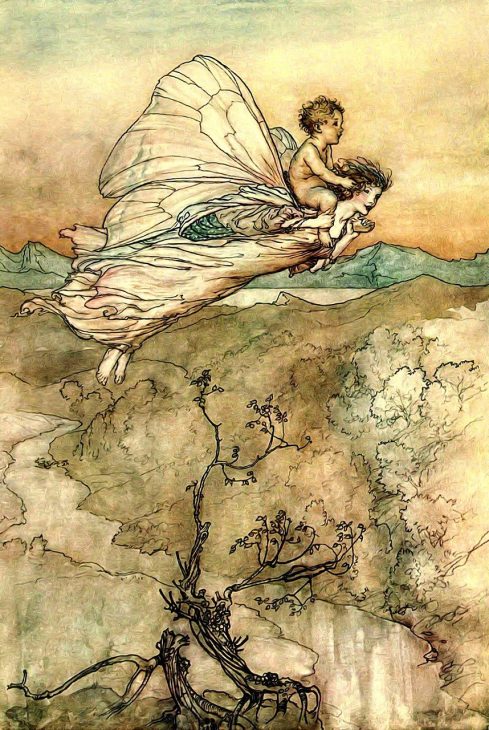 Image by Prawny from Pixabay
Image by Prawny from Pixabay
1. The situation might be ridiculous, but your characters don’t know that.
Let’s be honest. If you’re fighting for your life in a city that has been overtaken by a swarm of mindless winged humanoid killers, you’re probably going to be too busy trying to survive to worry about how silly it all actually is. That might come later, after you have done the surviving. If your characters treat their situation seriously (and it kinda is; they’re fighting for their lives), it’ll be much easier for your readers to suspend their disbelief while reading it. They’ll buy human-sized fairies attacking in swarms and consuming a city of millions in less than twenty-four hours.
It will probably also help to have at least one character who is familiar with really weird situations. Think of Mulder and Scully in the X-Files. They’re constantly facing things that, on the outside, are completely unbelievable, even ridiculous. But it works precisely because they take it seriously when they’re in the moment, and Mulder is a believer. However weird or out there a situation is, Mulder just accepts is as fact and rolls with it. It makes it easy for the viewer to do the same.

2. The situation is ridiculous, and your characters absolutely know it.
This isn’t an and/or situation with number one, trust me. If I found myself facing a mindless winged humanoid, I would absolutely demand of no one in particular what the actual f[redacted]. Having a character call out the idiocy of the situation they find themselves in — while taking it very seriously — is may be a way to get readers on board. This is especially true if the world you’ve built is encountering the situation for the first time.
If winged humanoids are a normal thing in the world, then having a character acknowledge how stupid that seems, will probably distance the reader and make it hard for them to suspend their own disbelief. However, if these creatures are not a part of your characters’ every day reality then having someone be absolutely incredulous at the situation they face will help your reader relate, making it easier for them to sink into the story.
It works for me, in any case. If the characters I’m reading aren’t absolute morons that question absolutely nothing, then I’m much more amenable to accept the scenarios they’re put through. Mind you, I’m not an especially critical reader, so I get sucked into stories a lot more frequently than most. It is both a blessing and a curse.
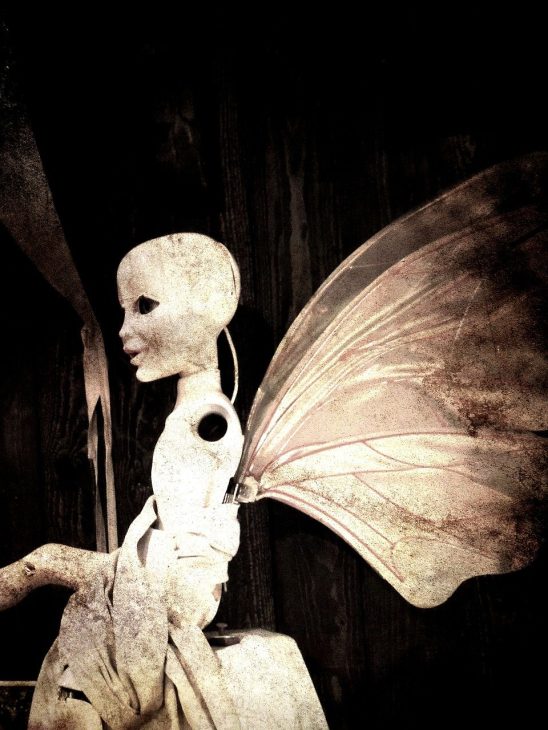 Image by Karen Nadine from Pixabay
Image by Karen Nadine from Pixabay
3. Keep it grounded
This might sound impossible, given the fantastic situation you’re trying to create, but keeping it as grounded as possible will help. There are a number of ways to do this. Providing real consequences for mistakes is one. Have people get hurt, or die. People will suffer in these situations if they ever actually happened; there will be grief, and fear, and anger. You’re already stretching incredulity with the situation. Have everyone dancing along unscathed will be pushing it much too far. This is especially important if it’s not taking place in a world that is easily relatable. I got a leg up, because the serial is set in a fictional city, but in the real world and set in 2024. There are a lot of touchstones that are easily digested for a reader.
It becomes harder if the entire world is fantastical. Finding something grounding in a world where trees talk or teleport, or whatever, is much harder. It’s not impossible, though. Find those touchstones and use them.
Did I achieve creating a story that brings people along and has them absolutely invested while also having gate silliest premise I think I could possibly conjure? No idea. But I tried, and I used these three (and other) things in the attempt. Maybe they’ll help you, too. If you’ve read books or are currently writing one which has an absolutely ridiculous premise, let me know what, and what worked (or didn’t). If you have any tips of your own for making a silly premise both believable and feel serious, also let me know in the comments below.
When S.M. Carrière isn’t brutally killing your favorite characters, she spends her time teaching martial arts, live streaming video games, and cuddling her cat. In other words, she spends her time teaching others to kill, streaming her digital kills, and a cuddling furry murderer. Her most recent titles include Daughters of Britain, Skylark and Human. Her serial The New Haven Incident is free and goes up every Friday on her blog.

Recent comments